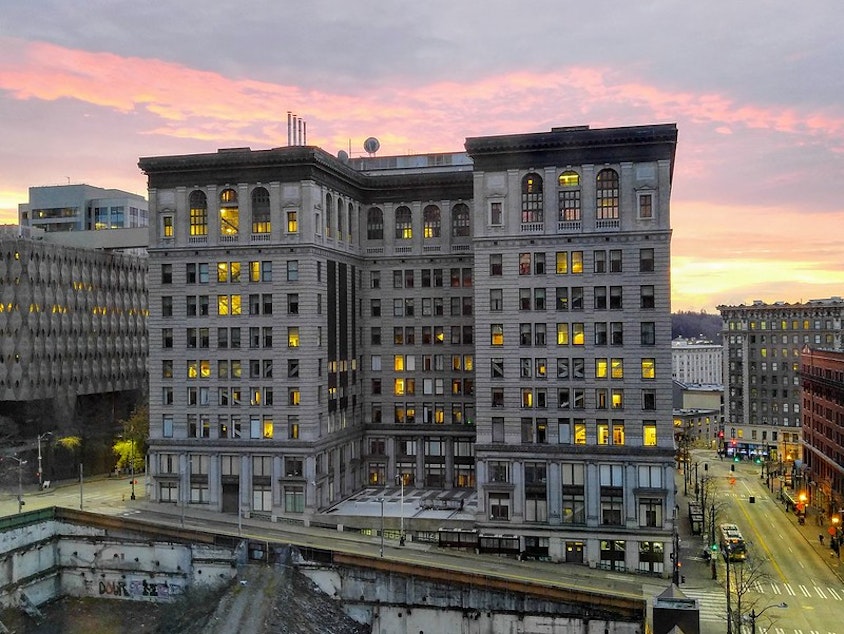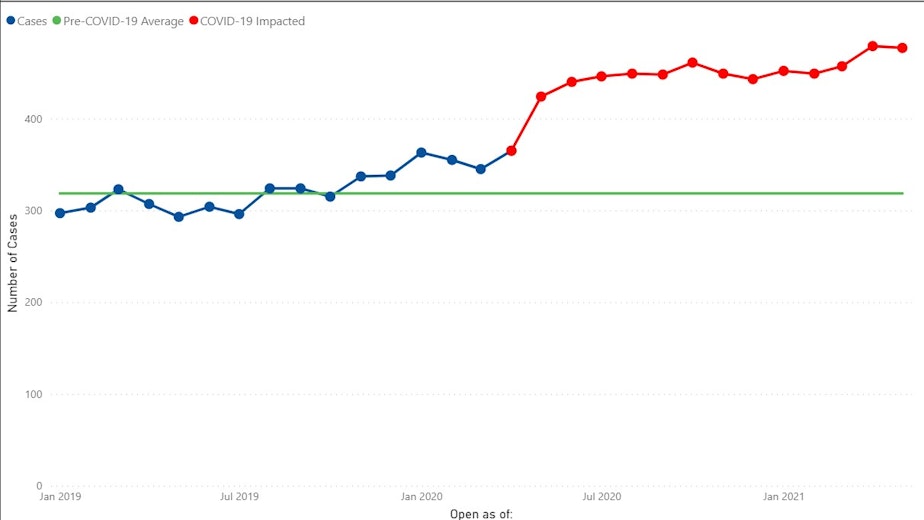King County seeks more judges, courtrooms and jurors to tackle criminal backlog

With courts closed during the pandemic, King County held just dozens of criminal trials over the past year rather than the usual hundreds. Meanwhile 6,000 cases are waiting to be resolved. People facing charges as well as victims of crime haven’t been able to move on with their lives. Now the Superior Court proposes bringing judges out of retirement and adding courtrooms to address the backlog.
Shatarra DeVose works for the King County Sexual Assault Resource Center. Her team of legal advocates supports victims of sexual assault and updates them on the status of their court cases. As those cases drag on during the pandemic, DeVose said the victims – whose average age is 16 – are feeling hopeless.
“A lot of them are just feeling like, what is the point, why did I do this,” DeVose said. “I gave up a significant period of my life and I came forward and I talked about something that was really hard for me to talk about.”
Courthouses closed in response to the pandemic last spring. Even when they reopened, progress was slower than usual because each criminal trial took up three courtrooms to allow for social distancing.
Last year also saw an increase in violent crime, meaning more cases now have to move through the court system. King County Prosecutor Dan Satterberg told the county council this month that his office filed 90 murder cases last year, up from a yearly average of 56. And two hundred people are currently awaiting trial for murder. “We’ve got a lot of really serious, violent cases to get through the system,” he said.
Now King County is asking for extra funding to get these cases moving forward. Jim Rogers is the presiding judge for King County Superior Court. He’s seeking $35 million dollars in federal aid to hire eight “judicial officers” or judges, out of retirement. “And if we’re able to add these judicial officers -- which are going to be frankly critical or we’re going to be in this backlog for years -- we’re looking for additional facilities, even if we get down to one trial, one courtroom," he said.
Sponsored

Rogers said it will also be critical for the county to find enough jurors to hear those additional cases. "I just want everyone who’s listening to seriously consider jury service,” he said, “because if we don’t have jurors to serve, we won’t be able to get justice for a lot of the people waiting for it.”
Rogers noted that during the pandemic, the court began screening jurors remotely, and that practice is expected to continue. So jurors don’t have to go to the courthouses in downtown Seattle or Kent unless they’re picked for a specific case.
Sponsored
With the extra funding, Rogers said King County could clear its backlog over the next three years. His request is being reviewed by the King County Executive and council. Without that funding, Rogers said the court would either have to put civil and family cases on hold, or let the criminal cases drag on even longer.
He said, “We have serious, violent cases where people have been in jail for three years.”
Public defenders agreed that the situation is critical. Anita Khandelwal heads King County’s Department of Public Defense. She said at this point her office is supportive of staffing up additional courtrooms.
Sponsored
“While we’re generally really loathe to grow the criminal legal system, if additional resources will help our clients get to trial and move on with their lives, then I think that’s something that we would, in this instance, support,” she said.
But Khandelwal said there’s another backlog, of less-urgent cases, that prosecutors haven’t filed yet. She said she is urging them to explore alternatives like diversion programs to keep as many as possible out of the court system.
Advocates for victims of sexual assault said even before the pandemic, courts didn’t serve victims well. A King County audit found that between 2015 and July 2018, 2,570 sex offenses were reported to the King County Sheriff’s Office. Charges were filed in Superior Court in ten percent of those cases, and someone was convicted in six percent.
Mary Ellen Stone is the director of the King County Sexual Assault Resource Center. The center is currently supporting 408 victims whose court cases have been pending for an average of 19 months.
She said, “what we want to do is make sure these victims who have been waiting over two years just to get to this point are prioritized.” Stone said victims of sexual assault need a sense of certainty, of control, and of being heard. Those assurances have been especially scarce this year.
Sponsored
But some cases did go forward. The center worked with one mother and daughter last year after the daughter, a young child, was sexually assaulted by her father. The case lasted just thirteen months; the father pleaded guilty last December.
The mother, who KUOW is not naming to protect her family’s privacy, said that guilty plea was a huge moment. “It was a really good feeling to be done with it, and realize that like, yeah the pandemic had put my life on hold, but as soon as that was over I felt like my life could begin again,” she said.
By this summer it should become clearer what steps the courts will take to address the backlog. The King County Council is expected to decide on additional funding by late June or early July.
You can contact a national sexual assault hotline at 1-800-656-HOPE (4673).




